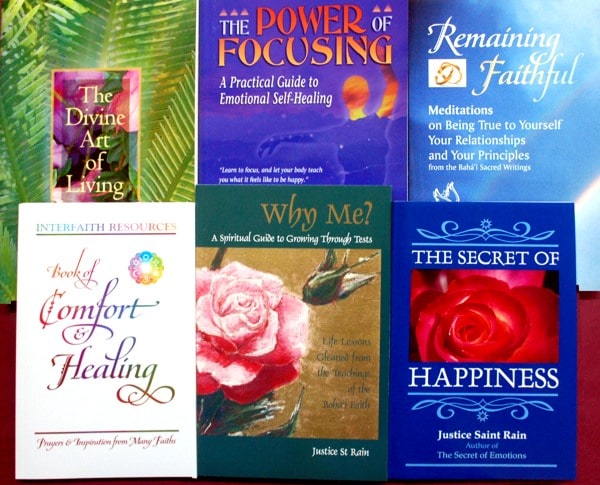This week, I’m posting the very end of the book, where I explore why and how God tests humanity as a whole, as He is right now.
After that, I end by giving you permission to be angry or upset with God. No matter how logical my explanations for suffering might be, it still hurts. It is OK to be upset. God understands.

Testing Humanity
All of the different kinds of tests that I have discussed in relation to us as individuals, also apply to humanity as a whole. God motivates and guides individuals, groups, nations and races; allows us to suffer the consequences of our disobedience; and, when necessary, allows us to suffer in unexpected and disturbing ways. In the process of guiding humanity, sometimes relatively innocent, spiritual individuals experience overwhelming and unavoidable tests. We must have faith that these events do serve a greater purpose, and that innocent victims will receive the sure and just recompense God has promised. God is infinitely loving and just, but the broad mechanisms of His justice are often hidden from our understanding.
He will never deal unjustly with any one, neither will He task a soul beyond its power. He, verily, is the Compassionate, the All-Merciful. Bahá’u’lláh
The following quotation about the Titanic disaster explores this mystery.
… Although such an event is indeed regrettable, we must realize that everything which happens is due to some wisdom and that nothing happens without a reason. Therein is a mystery; but whatever the reason and mystery, it was a very sad occurrence, one which brought tears to many eyes and distress to many souls. I was greatly affected by this disaster. Some of those who were lost voyaged on the Cedric with us as far as Naples and afterward sailed upon the other ship. When I think of them, I am very sad indeed.
But when I consider this calamity in another aspect, I am consoled by the realization that the worlds of God are infinite; that though they were deprived of this existence, they have other opportunities in the life beyond, even as Christ has said, “In my Father’s house are many mansions.” They were called away from the temporary and transferred to the eternal; they abandoned this material existence and entered the portals of the spiritual world. Foregoing the pleasures and comforts of the earthly, they now partake of a joy and happiness far more abiding and real, for they have hastened to the Kingdom of God. The mercy of God is infinite, and it is our duty to remember these departed souls in our prayers and supplications that they may draw nearer and nearer to the Source itself.
….Therefore, the souls of those who have passed away from earth and completed their span of mortal pilgrimage in the Titanic disaster have hastened to a world superior to this. They have soared away from these conditions of darkness and dim vision into the realm of light. These are the only considerations which can comfort and console those whom they have left behind.
Furthermore, these events have deeper reasons. Their object and purpose is to teach man certain lessons. We are living in a day of reliance upon material conditions. Men imagine that the great size and strength of a ship, the perfection of machinery or the skill of a navigator will ensure safety, but these disasters sometimes take place that men may know that God is the real Protector. If it be the will of God to protect man, a little ship may escape destruction, whereas the greatest and most perfectly constructed vessel with the best and most skillful navigator may not survive a danger such as was present on the ocean. The purpose is that the people of the world may turn to God, the One Protector; that human souls may rely upon His preservation and know that He is the real safety. These events happen in order that man’s faith may be increased and strengthened….
Let no one imagine that these words imply that man should not be thorough and careful in his undertakings. God has endowed man with intelligence so that he may safeguard and protect himself. Therefore, he must provide and surround himself with all that scientific skill can produce. He must be deliberate, thoughtful and thorough in his purposes, build the best ship and provide the most experienced captain; yet, withal, let him rely upon God and consider God as the one Keeper. If God protects, nothing can imperil man’s safety; and if it be not His will to safeguard, no amount of preparation and precaution will avail. ‘Abdu’l-Bahá

Getting Angry at God
Sometimes neither the most logical explanations nor the most compassionate reassurances help. Something unfair has happened, and it is God’s fault, and you are angry, and there is just no way around it.
That’s Okay.
God is patient. God can wait. God can even love you while He waits for you to work through this thing and get to the other side. If you ask Him to, He can even help you through it. Your anger does not frighten God—it only frightens you.
Because it is frightening to be angry at God, you may be tempted to try to find a way around it. That is what one brilliant scholar did when his son died. It was so frightening to be angry at God that he had to take God out of the picture entirely. He wrote a famous book about how you can be a good person and still have bad things happen to you. In order to forgive God for the loss of his child, he had to believe that God did not have the ability to save his son. Bad things happen, he said, because God is powerless to stop them. God is a loving spirit Who is incapable of operating in the physical world He created. This belief let God off the hook, so the father could stop being angry.
But consider this analogy: A while back, my wife explained that it was much easier to say “no” to our children when we were poor. Any time they asked us for something that we knew wasn’t spiritually or physically good for them, we could tell them, “Sorry, we just can’t afford it.” That was an explanation that they could understand.
Now that we have a little more money, when they ask for things (like violent video games or expensive clothes) we have to explain that what they want for themselves and what we want for them are not the same. They don’t like that. It is an explanation that requires maturity to understand. But they aren’t mature. They want what they want, and they feel that we are terribly unjust and cruel for not giving it to them. They get angry with us, and sometimes scream, shout or cry. But that’s Okay. We are the parents. We know that there are bigger issues involved than short-term happiness. We want them to develop spiritual priorities and are willing to endure their tantrums in order to help them grow. We will continue to love them—before, during and after their spat of anger.
It would be so much easier just to say, “We don’t have the money”—to pretend to be impoverished, even though it isn’t true. Likewise, when we adults don’t get what we think is “right” and “just” in life, it is tempting to try to impoverish God—to pretend that He just doesn’t have the power to get us what we want.
But it doesn’t work that way. God created the universe. God can do anything—even raise the dead. So if it makes you angry that He doesn’t do it for you, then go ahead—be angry. It is Okay. My toddler is angry at me a dozen times a day. It doesn’t make him a bad child or me a bad parent. Likewise, our inability to understand why God allows us to suffer does not make us evil or Him uncaring. Nor does it make Him powerless. It only means that He is wise enough to let us learn on our own.
And if you are facing a loss and need to grieve, that is Okay too. Grieve as long as you need to—just don’t let your grief cause you to forget the story of the rose.
Do you still remember the rose? [from chapter 1] Clipped and pruned, she did not give up her faith in a loving Gardener, but rather she looked for lessons to be learned and grew in a hundred new and unexpected ways. Well, the story continues…
After a few years, the rose became the most beautiful flower in the plant nursery, so one day the gardener came in, dug her up by the roots, and carried her away. From the perspective of the other remaining rose bush, she was dead, dead, dead. He became lonely and angry. He cursed the gardener, and considered life a mockery.
Meanwhile, transplanted to a spot by a fountain at the entrance to a sacred shrine, the beautiful rose bush sent her fragrant perfume throughout the garden, shed her velvet petals upon those hallowed grounds and uplifted the hearts of all who entered therein.
In Conclusion
“Why me” is the ultimate question. “Who, what, when, where and how” may be the questions of scientists and historians, but why is the question of philosophers. It seeks to comprehend the invisible realm of meaning and purpose.
“Why me” frames the question in very personal terms, linking the individual with the guiding hand of the infinite.
It is a reasonable question. It is not too much to ask, is it, to know what part we play in the great scheme of things? And so I encourage you to continue to ask.
I believe that the ability to ask “Why?” is one of the crucial differences between humans and animals. It demonstrates our ability to contemplate the abstract and the eternal. It is the question that gives birth to philosophy and religion. From this perspective, we can think of the question “why me?” as the ultimate human question—linking the individual to the infinite and the personal to a sense of purpose.
Why me?
I hope you have found the answers I have offered in this book interesting and intriguing—perhaps, I pray, even helpful and comforting. I would like to end with a short summarizing quotation from Shoghi Effendi, the great-grandson of Bahá’u’lláh.
As we suffer these misfortunes we must remember that the Prophets of God Themselves were not immune from these things which men suffer. They knew sorrow, illness and pain too. They rose above these things through Their spirits, and that is what we must try and do too, when afflicted. The troubles of this world pass, and what we have left is what we have made of our souls; so it is to this we must look—to becoming more spiritual, drawing nearer to God, no matter what our human minds and bodies go through. Shoghi Effendi

If you feeling stressed right now, you might consider reading one or more of the many books in our “Self-Help and Relationships” category, including Fire & Gold, Divine Therapy, Counting our Blessings, Falling into Grace, The Secret of Emotions, and many others. Just a page or two a day might help you have a more optimistic perspective.

